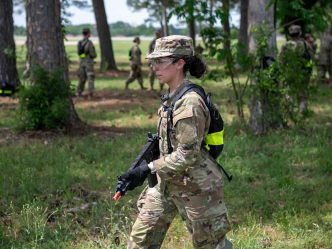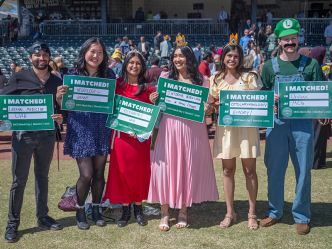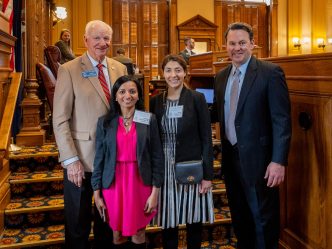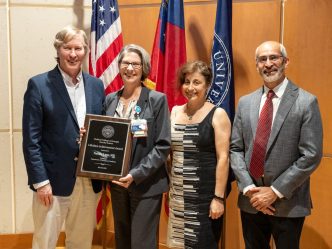Medical College of Georgia student Diana Toro has a willingness to learn and a greater desire to share that knowledge — including a series of videos to help people better understand COVID-19.
When she was 17 years old, Toro started interning at the Centers for Disease Control and Prevention. She continued during her summer breaks throughout college, working at the National Center for Immunization and Respiratory Diseases, where she contributed to the Vaccines for Children Program.
“This program provides vaccines to children who lack health insurance or otherwise cannot afford them,” Toro said. “With this experience, I learned more about public health and the powerful role a physician plays in a patient’s life.”
While she is still undecided on a specialty at MCG, she is “confident that after clinical rotations, I will have a better idea.”
Toro has a passion for biochemistry and loves to teach. As a sophomore at Georgia Tech, she founded the Little Einstein’s Organization, which is a chartered campus organization that leads Science, Technology, Engineering and Math (STEM) activities with underserved children in Atlanta’s inner-city public schools.
“Our goal was to inspire a love for STEM among kids in our Atlanta community, and I hope to continue this same kind of work here in Augusta,” said Toro, who has recently been named president of the Junior Medical League, which conducts STEM activities with underserved children in the Augusta community, and the Pandemic Medical Education Club, both at MCG.
When the pandemic began in 2020, Toro was finishing her senior year. For their senior biochemistry project, Toro, along with friend and fellow first-year MCG student Nick Trinh, decided to review a publication comparing the molecular structure of the SARS-CoV-2 virus to the original SARS-CoV virus that emerged in 2003.
“Our biochemistry professor introduced us to PyMol, a molecular graphics tool that can be used to visualize the three-dimensional structure of proteins,” Toro said. “Exploring a detailed 3D model of the SARS-CoV-2 virus opened up a brand-new world to me. I could explore the amino acid sequence of the spike protein on the virus, see how mutations in the virus could change its interaction with the ACE2 human receptor, and visualize the conformational changes that the spike protein undergoes as it fuses with our host cell.
“Rather than some invisible force spreading in the community, this software turned the SARS-CoV-2 virus into something tangible — something I could interact with, manipulate, and understand better,” she added. “In many ways, actually seeing and interacting with these virus particle models made the pandemic feel less frightening to me. This is what inspired me to continue making more videos and to share them with my community.”
Since their project, Toro has continued making videos on her YouTube channel to help people understand more about the virus that causes COVID-19.
Trinh, who is also undecided on his specialty, said he knew Toro’s videos would become increasingly popular over time. He said during these times when factual scientific information about the virus is scarce to the public, more people are going to YouTube for answers.
“When they come across Diana’s videos, they know they can trust her facts and her videos are interesting and engaging,” Trinh said. “It was natural for Diana to continue to make new content as a means of spreading reliable information about the virus, and if she has the time to keep it up, I know she will be a big success.”
Trinh said he is also motivated by his friendship with Toro and her passion for learning and educating.
“It is reassuring to know that I always have someone to reach out to if I ever have any questions,” Trinh said. “Although her videos are informative, her success is not a result of luck or good timing. They are a consequence of her personal initiative and her desire to share her knowledge with the world, and that is what I truly am inspired by.”
In her short time in Augusta, Toro has already made quite the impression on Drs. Rebecca Pierce and Rohini Mehta.
“From the first time I met Diana, she impressed me as a bright, determined young lady,” said Pierce, who is Toro’s advisor and an assistant professor of pediatrics with the Children’s Hospital of Georgia and MCG. “She has a history of working with the CDC on vaccines for children and a strong interest in public health.”
Mehta, who is an assistant professor in the Department of Psychiatry and Health Behavior, worked with Toro through the Case Based Learning curriculum at MCG.
“Diana early on demonstrated her innate ability to learn a subject thoroughly and teach it effectively,” Mehta said. “She is clearly a very bright and motivated person.”
Both Pierce and Mehta were impressed with her videos, calling them well researched, informative and highly effective teaching tools.
“She did an excellent job of making videos to help both the medical community and community at large better understand COVID and what we know about it,” Pierce said. “I am hopeful that her videos will help encourage others that the COVID vaccine is safe and the answer to ending this pandemic.”
Mehta added, “It is extremely impressive that she has taken the initiative to educate others on these important and complex medical topics.”
Early in January, Toro was notified she’d be able to receive the Pfizer vaccine and later posted a message on Facebook about her decision to get vaccinated. In part of her message, she said as medical school students, they were setting an example for others to get vaccinated.
“When I came home for Christmas break, my friends and family members flooded me with questions about the Pfizer vaccine. … The flood of questions made me realize that during this pandemic, our community will look to us as leaders,” Toro said. “After the FDA approved the Pfizer-BioNTech vaccine for emergency use authorization, I knew there would soon be more people asking these same questions.
“I felt a responsibility as a future health care provider to provide my community with answers,” she continued. “Fear and uncertainty have been the overarching themes of this pandemic. However, my research experience has shown me that during uncertain times, education is empowering. My goal is to use my background in biochemistry to share information on the Pfizer vaccine and give people the necessary tools to make informed decisions in their lives.
“Since I received the vaccine, my friends from college and high school have been reaching out asking me about any side effects. I am also beginning to feel the responsibility and weight of being a future health care provider. I know that lives have been lost on a massive scale and that our health care system has suffered tremendously at the hands of the COVID-19 virus. I feel compelled to do my part in helping bring an end to this pandemic.”
Seeing how Toro is handling herself and how she is thinking about her future patients has Pierce and Mehta encouraged.
“I am incredibly proud to be her advisor,” Pierce said. “Her ambition to make these videos as well as the other things she is doing is very encouraging to me about the future of medicine. She embodies MCG’s vision to deliver exceptional care to lead to a healthier community. I have only known Diana about six months, but I am excited to see what else she will do with her time and talents.”
“It is tremendously encouraging to know that we are all in great hands with future physicians like Diana entering the field,” Mehta said. “She is an excellent example of how MCG students are changing the future of health care for the better.”
 Augusta University
Augusta University



